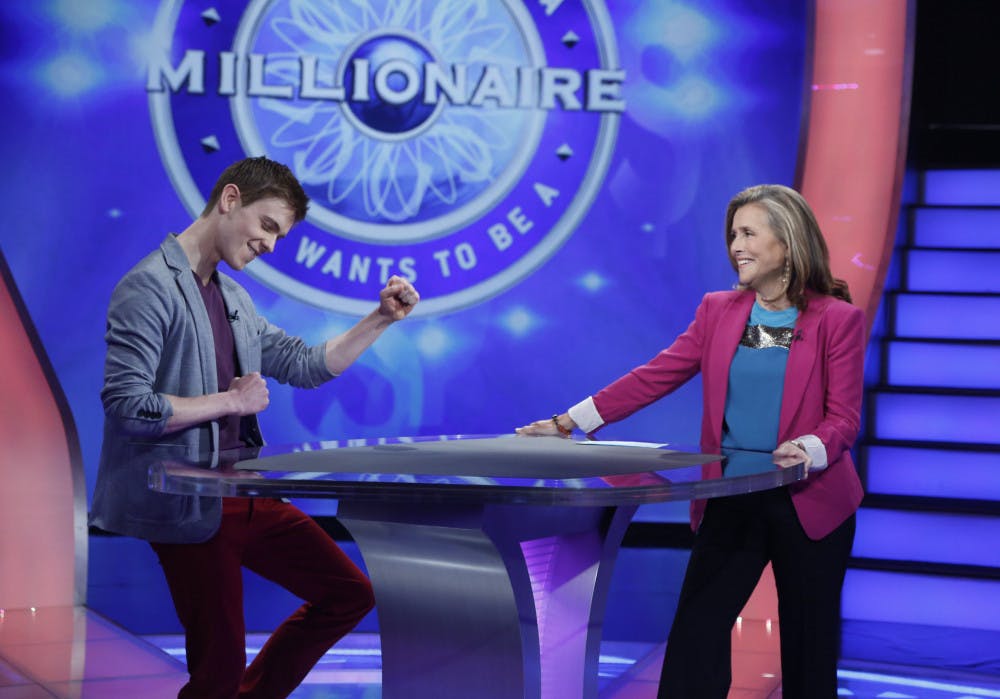Drew Kunas ’12 didn’t necessarily want to be a millionaire. But last October, he got his chance — stepping onto the “Who Wants to Be a Millionaire” television set to try his hand at scoring seven figures opposite award-winning host Meredith Vieira.
Kunas passed through two competitive selection processes to earn the contestant role in an episode that aired Thursday afternoon.
Taking a bet
Kunas initially had no plans to audition for the show when he moved to New York City after graduation to take a job with hedgefund Two Sigma Investments. But Kunas, a former member of campus improv troupe Karin and the Improvs, kept up with improvisation in the city and was invited by an improv friend to attend an open audition together for the show.
The decision to try out was “totally random,” Kunas said. “I just thought it’d be fun to do it.”
Kunas and his friend traveled to the audition but were two minutes late for the first test: a 30-question trivia quiz with a 10-minute time limit.
“It’s in this giant really quiet room with proctors running around and a bunch of geeky people furiously scribbling,” he said. After prospective contestants completed the test, they turned in their Scantron forms and were assigned a number to wait for their results.
As Kunas and his friend waited outside the testing room, an employee of the show emerged, Kunas said. The man proceeded to give all the test-takers a “suicide prevention speech,” preemptively consoling people who would not make the cut. “‘Look, if you don’t make it on ‘Millionaire,’ it doesn’t mean you’re a bad person,’” Kunas recalled him saying. “‘This is not the end of the world.’”
“I’m sure (the speech) was made through trial and error,” he added.
Kunas passed the trivia exam, moving on to the second stage of the selection process, which asks for a questionnaire and sits potential contestants down for an interview with one of the show’s producers.
During Kunas’ interview, the producer took notes on his personality, but “seemed really bored,” Kunas said. “Then he wrote B+ on my paper.”
“I went, ‘Ah, hell no,’” Kunas said. “I amped up the charm, amped up the energy. ‘You are going to like me by the end of this,’” Kunas recalled thinking to himself.
Kunas also underwent a camera test, during which people behind the camera alternated “rapid-fire” positive and negative reactions to “see how you would react under pressure,” he said.
The next day, a representative from the show called and asked Kunas to appear at the New York City ABC studio a week later for a taping.
Cashing in
“After I found out I was going to be on ‘Millionaire,’ I was walking around my office, and I was really excited,’” Kunas said. “And whenever I’d tell anyone, they’d be like, ‘Oh my God, that’s so cool! ... Have you talked to Todd? He was on that before you.’”
“I was like, ‘Who the (expletive) is this Todd stealing my thunder?’” Kunas joked.
But Todd proved useful in the week before Kunas went on the air.
“We had like a Haymitch and Katniss ‘Hunger Games’ thing going on, where he was like, ‘I’ve done this before — let me teach you how to do it,’” Kunas said.
Todd coached Kunas through a number of common question topics — from presidents to “the last team that won a major sporting event” — over the next six days, during which Kunas “studied like crazy,” he said.
Despite the fact he “learned a whole bunch of weird facts,” Kunas said none of them appeared during his run on the show.
Play the (wo)man
The originally scheduled day of the taping, Oct. 15, Kunas arrived at ABC studios in Manhattan early in the morning, he said.
Staffers of the show “try to make you have a concise and interesting backstory,” Kunas said, describing the process of filling out a questionnaire about himself. He included an “embarrassing” detail — his occasional tendency to sleep-eat in the middle of the night. Kunas worried this could be his backstory. “I was going to be the sleep eater,” he said.
After being prepped, he was sent to the waiting room, which he described as “the lobster tank.”
“They’ll take someone at a random point, mic them up and they’ll never be seen again,” he said.
Because phones and study materials were prohibited in the studio, Kunas said he spent most of his backstage time chatting with three other contestants, who ranged from a “romance novel editor” to a New Jersey bartender who consumed four Five-Hour Energy drinks while waiting to go on stage.
Despite the “crazy cabin fever,” all four were held to tape the show the next day. When the contestants returned the next morning, Kunas was the first contestant to be called.
Mo’ money mo’ problems
Being the first contestant was “super nerve-wracking,” Kunas said. Stage staffers outfitted him with a mic and led him out onto the stage once he was called.
But some things were reassuringly familiar.
“The way the set is, it looks exactly the way it does on TV,” he said, adding that there were no green screens.
The opening banter with Vieira, however, was not.
“You’re not allowed to see Meredith until your show time,” Kunas said. “Everything is set up around Meredith.”
Vieira opened the show with a comment on Kunas’ “free food at work diet,” which he described on air as daily pilfering from office eating spaces.
“We need to get you some help,” she joked on-screen, reaching over to touch his hand.
“Who Wants To Be a Millionaire” revamped its game rules in 2010, replacing the traditional three lifelines with two opportunities to skip questions — with no penalty but giving up potential prize money — and one to poll the audience. The questions were also split into two rounds, one with 10 randomized questions with prize values ranging between $100 and $25,000, and one set of questions that follow the typical sequential climb to the $1,000,000 prize.
Kunas used his lifelines quickly, citing a tendency to be “risk-averse” while playing. “My utility function (dropped) off like that” once he reached $15,000, he said. Kunas racked up $24,100 during play, but after using his final lifeline on the seventh question, elected to walk away on the eighth. According to game rules, Kunas left with half of the accumulated winnings and took home $12,050.
Seeing green
When Kunas’ episode aired Thursday afternoon, his parents and younger sister watched the episode together at home.
In Providence, nine members of Karin and the Improvs also gathered Thursday evening to tune into a taped airing of the show.
Before the taping, members took bets on how Kunas would perform, with estimates ranging from $57,000 to $280,000.
As Kunas walked out onto the screen, one of the members commented in the dark: “It’s so weird seeing him like this.”
“I didn’t think he would win that much,” said Ilya Raskin ’14. “I think Drew’s really smart — I just think it’s a hard game.”
“It’s hard to win a lot of money because you have to make it into the top round,” he added.
The buck stops here
Kunas said winning cash was a secondary result.
“The reason I went on the show wasn’t because I wanted money,” Kunas said. “I just wanted to be entertaining.”
Kunas’ mother Sharon Kunas, who was in the audience during her son’s taping, described his performance as entertaining.
“Drew’s (interaction with Vieira) was much more personal and spontaneous,” she said, describing their conversation as “lots of witty remarks back and forth.”
“It really just worked between the two of them,” she added. “It was like they were old friends and very comfortable with one another.”
During the taping, audience members were also invited to audition for the show, Sharon Kunas said.
Most audience members attempted to take the 30-question exam, including herself, she said.
“It was hard,” she said. “I think I’m reasonably bright, no deficiencies or all that.”
Some of the questions did not have answers that could be reasoned out, she added. “Either you knew them or you didn’t.”
The test is geared toward “a very broad range of topics” and resembles the questions that appear on the show, said Trisha Miller, a spokeswoman for “Who Wants to Be a Millionaire.”
“It’s going to be a mishmash of topics,” Miller added. “Contestants who do well on the show tend to know a little about a lot of things.”
Sharon Kunas said her son maintained a level head despite the show’s competitive nature.
“For Drew, he always tends to be a little understated about things — he really didn’t make a big deal about it,” she said.
“(‘Millionaire’) was a punctation point and a really great one, but he kept it in perspective,” she added.
Tens of thousands of people try out annually, but only about 300 make the contestant cut, Miller said. Each of the show’s contestants, she added, are “very unique.”
“They run the gamut,” she said, citing differences in age and occupation, from “stay-at-home moms” to “nuclear physicists.”
Despite their many differences, Miller noted two things they have in common.
“They’re all really smart and have a desire to win a million dollars,” she said. “I mean, who doesn’t?”
— Additional reporting by Jordan Hendricks

ADVERTISEMENT




